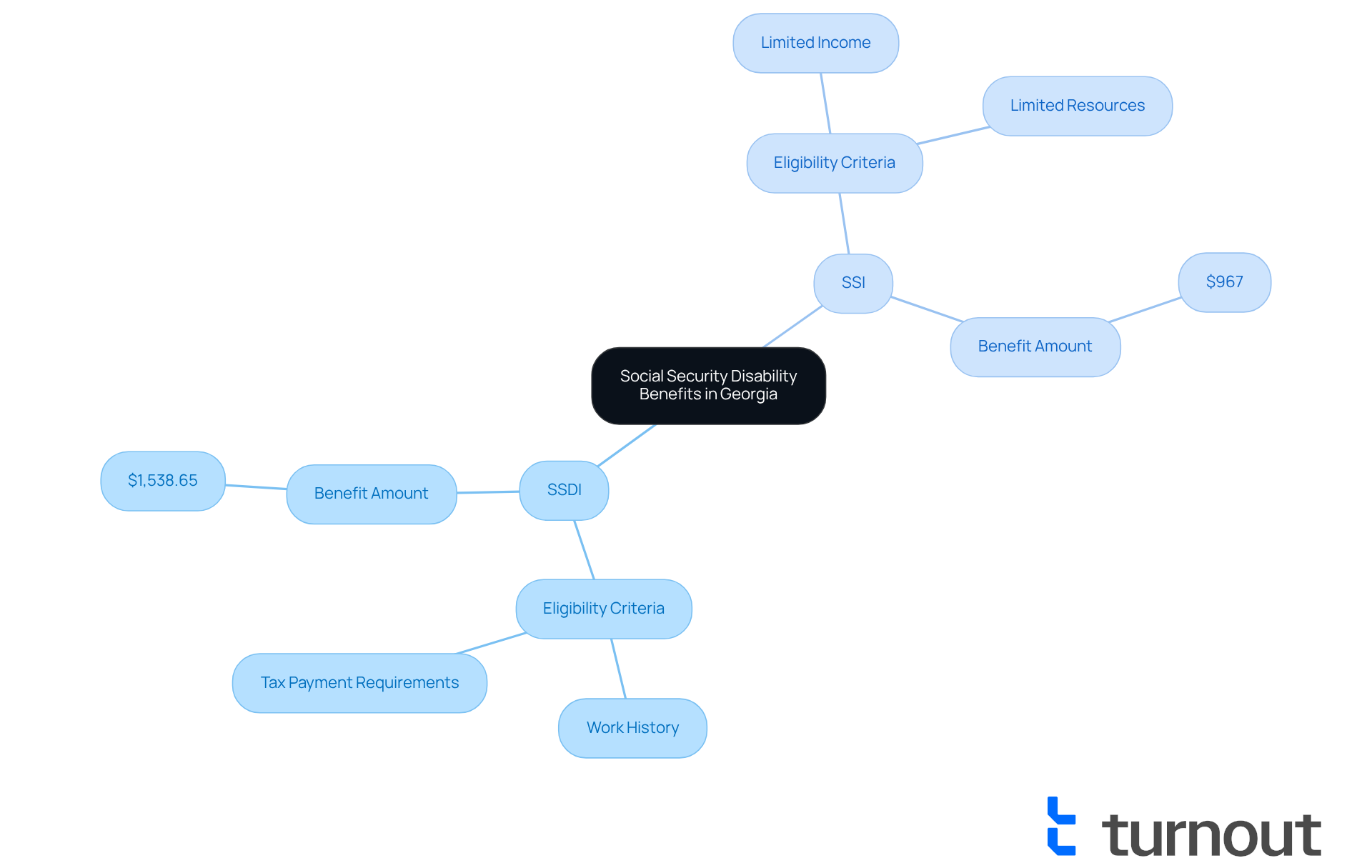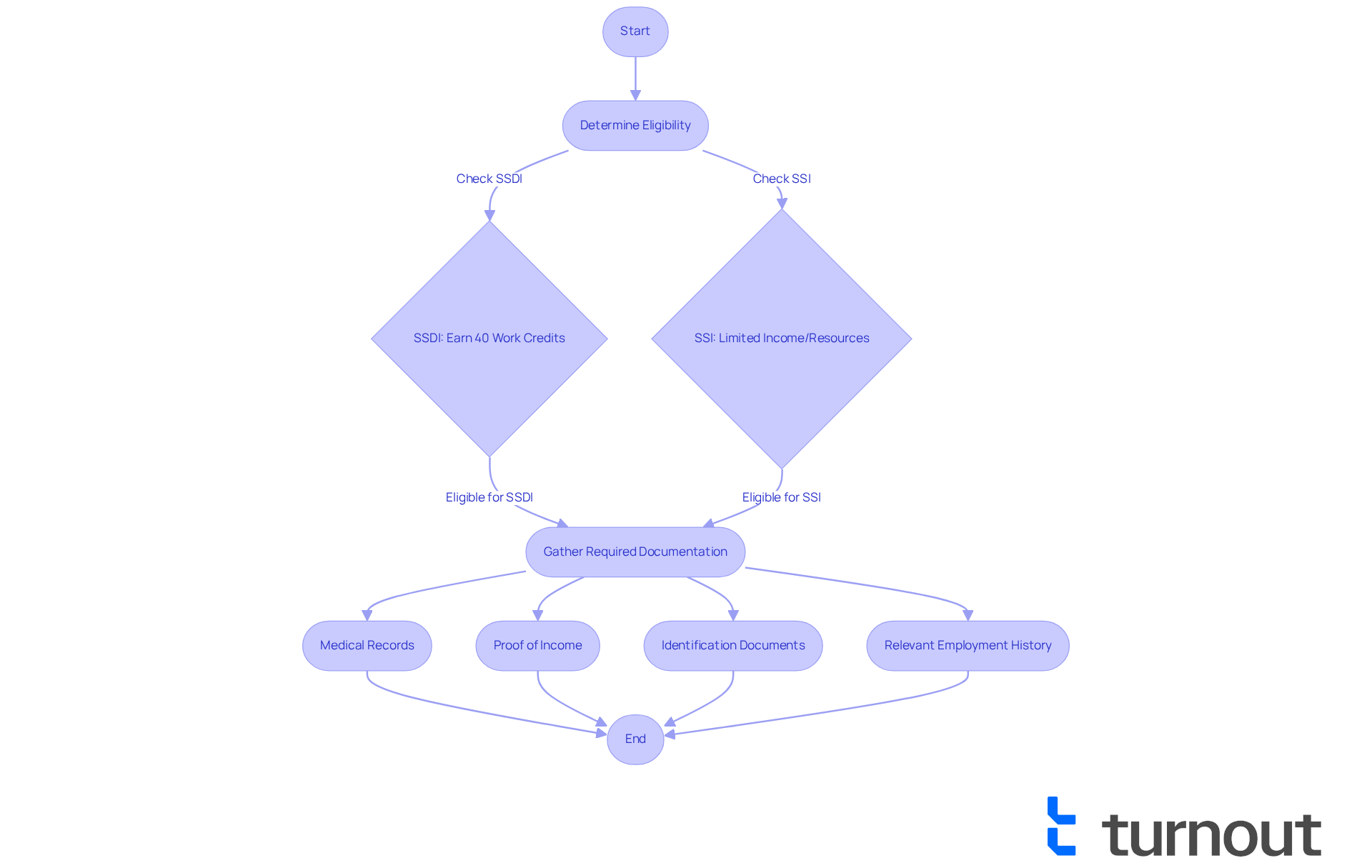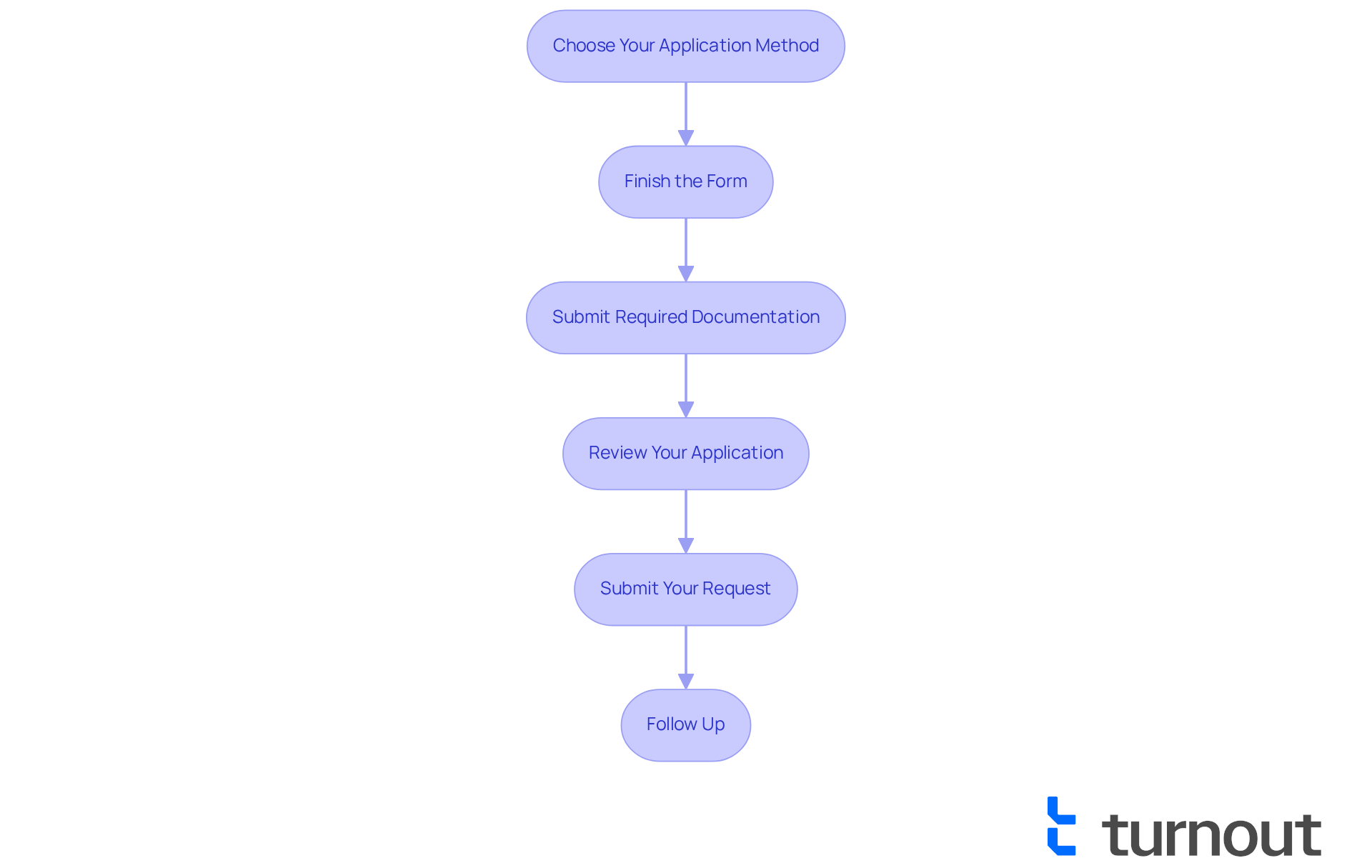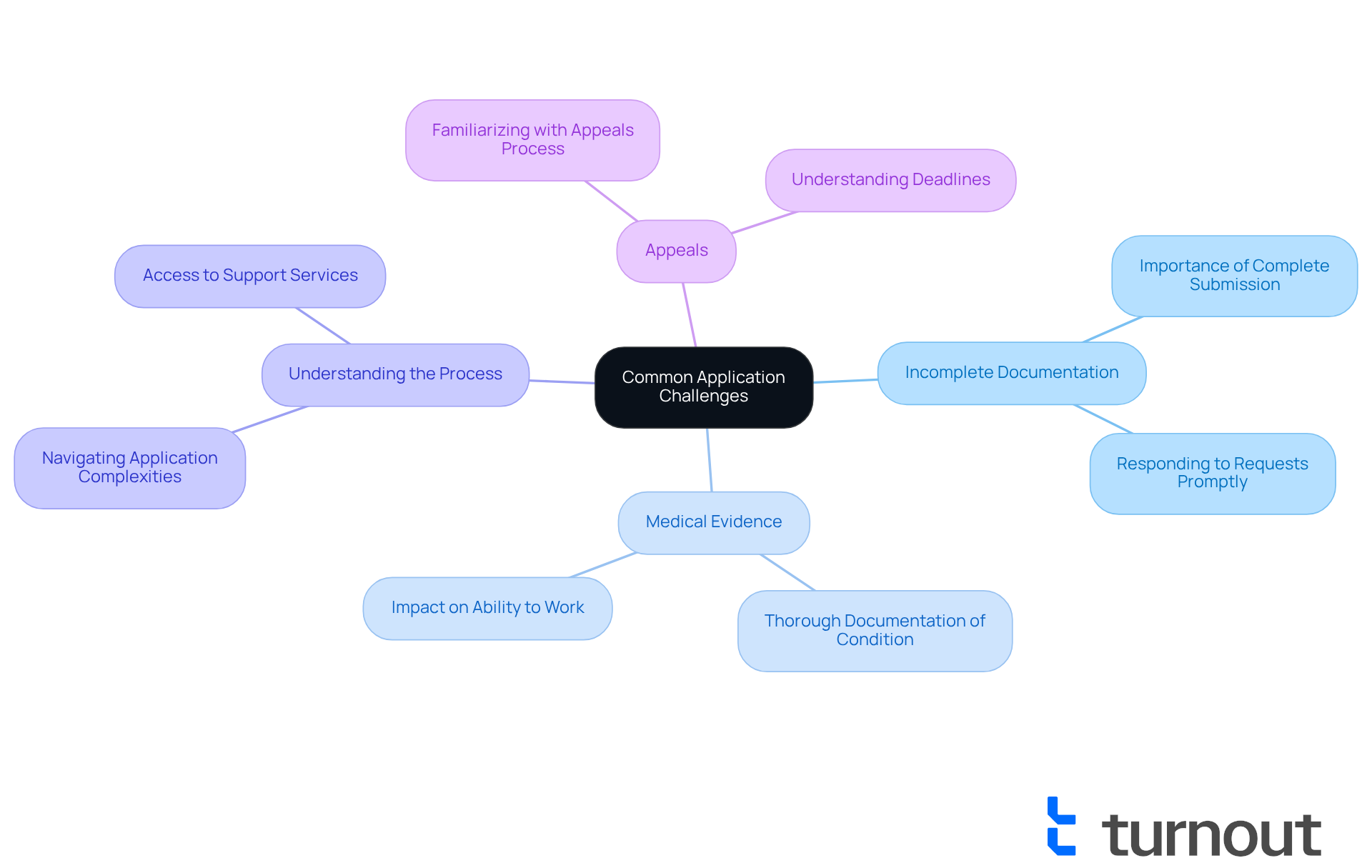Overview
Navigating Social Security Disability benefits in Georgia can feel overwhelming, and we understand the challenges you may face. This article serves as a caring guide, detailing the important distinctions between Disability Insurance (SSDI) and Supplemental Income (SSI) programs. By understanding these differences, you can make informed decisions that best suit your needs.
It’s crucial to grasp the eligibility criteria for these programs. Gathering the necessary documentation can be daunting, but remember, you are not alone in this journey. We encourage you to reach out for support from trained nonlawyer advocates who can help you through a structured application process. This support can empower you, providing the guidance you need to navigate this complex system with confidence.
As you embark on this path, know that understanding the application process is key. Taking each step thoughtfully can make a significant difference. We’re here to help you feel equipped and informed, ensuring that you have the resources necessary to advocate for yourself. You are not alone, and together, we can work towards securing the benefits you deserve.
Introduction
Navigating the complexities of Social Security Disability benefits in Georgia can feel overwhelming, especially for those already facing the challenges of a disability. We understand that this journey is not easy. With two primary programs—Disability Insurance (SSDI) for those with a work history and Supplemental Income (SSI) for individuals with limited resources—it's essential to grasp the nuances of eligibility and application processes.
As you embark on this path, you may encounter significant hurdles:
- Gathering necessary documentation can seem daunting.
- Addressing potential denials may add to your stress.
It's common to feel uncertain about how to ensure you are adequately prepared to secure the benefits you deserve. Remember, you are not alone in this journey. We're here to help guide you through the process.
Understand Social Security Disability Benefits in Georgia
In Georgia, we understand that navigating disability benefits can be challenging. Disability benefits are mainly offered through two programs: Disability Insurance (SSDI) and Supplemental Income (SSI). SSDI is designed for individuals who have worked and paid Social Security taxes, while SSI is aimed at those with limited income and resources, regardless of work history. Understanding the differences between these programs is essential for determining which benefits you may qualify for.
It's important to note that this organization is not a legal firm and does not offer legal guidance; our services do not create a client-professional relationship. Additionally, eligibility criteria include having a qualifying disability that prevents you from working for at least 12 months. We know that it can feel overwhelming, but Turnout offers assistance in navigating these processes through trained nonlawyer advocates. We're here to ensure you receive the support needed to understand your options without the complexities of legal representation.
Familiarize yourself with the current benefit amounts, which for 2025 are approximately:
- $1,538.65 for SSDI recipients
- $967 for SSI recipients
These figures can significantly influence your financial planning. Remember, you are not alone in this journey; we are here to help you every step of the way.

Determine Eligibility and Gather Required Documentation
If you're considering applying for Disability benefits in Georgia, it's essential to understand the criteria you need to meet. For SSDI, a key requirement is earning enough work credits—typically 40 credits, with at least 20 earned in the last 10 years. On the other hand, for SSI, demonstrating limited income and resources is crucial.
Once you feel confident in your eligibility, it's time to gather the necessary documentation. This includes:
- Medical records that detail your condition and treatment history.
- Proof of income, such as pay stubs or tax returns.
- Identification documents, including your Social Security number and birth certificate.
- Relevant employment history that supports your claim.
We understand that navigating this process can be overwhelming, but participating in this program connects you with skilled non-legal advocates. They are here to help you through the SSD claims process, ensuring you have the support needed to manage your submission effectively. Remember, while Turnout is not a law firm, the assistance provided is designed to guide you, not to constitute legal advice.
Organizing these documents ahead of time can significantly streamline your application process and help avoid unnecessary delays. You're not alone in this journey; we're here to help you every step of the way.

Follow the Step-by-Step Application Process
Applying for social security disability in ga benefits can feel overwhelming, but we're here to guide you through each step of the process with care and understanding. Follow these steps to make your application as smooth as possible:
-
Choose Your Application Method: You can apply online at the Social Security Administration (SSA) website, by phone at 1-800-772-1213, or in person at your local SSA office. Each method is designed to accommodate your needs.
-
Finish the Form: Take your time to fill out the form (SSA-16 for SSDI or SSA-8000 for SSI) accurately. It’s important to provide detailed information about your medical condition, work history, and daily activities. We understand that this can be a lot to gather, so don’t hesitate to ask for help if you need it.
-
Submit Required Documentation: Attach all necessary documents, including medical records and proof of income. Ensure that all documents are clear and legible, as this will help avoid delays in processing your application.
-
Review Your Application: Before submitting, double-check all information for accuracy. We know how crucial it is to get this right, and a thorough review can prevent unnecessary setbacks.
-
Submit Your Request: Once everything is complete, submit your request and keep a copy for your records. This step is vital, as it ensures you have a reference for your application.
-
Follow Up: After submission, you can check the status of your request online or by contacting the SSA. It’s common to feel anxious during this waiting period, so be proactive in responding to any requests for additional information.
At Turnout, we are dedicated to supporting you throughout this process. Our trained nonlegal advocates are here to help you navigate the complexities of the social security disability in ga submission. While we do not provide legal representation, we offer tools and services designed to empower you. Remember, the SSD submission process can be challenging, but you are not alone in this journey. We are here to support you every step of the way.

Troubleshoot Common Application Challenges
When applying for Social Security Disability benefits, you may face several common challenges that can feel overwhelming:
- Incomplete Documentation: It's crucial to ensure that all required documents are submitted. Missing information can lead to delays or even denials. If you receive a request for additional information, please respond promptly; we understand that this can be stressful.
- Medical Evidence: Insufficient medical evidence is often a reason for denial. Make sure your medical records clearly document your condition and its impact on your ability to work. Remember, your health matters, and having thorough documentation can make a significant difference.
- Understanding the Process: We know that the application process can be confusing. This platform offers access to tools and services designed to assist you in navigating these complexities. Don’t hesitate to reach out to support services or advocacy groups for help. It’s important to note that Turnout is not a law firm and does not provide legal advice; however, we utilize trained nonlawyer advocates to guide you through this process.
- Appeals: If your request is denied, you have the right to contest that decision. Familiarize yourself with the appeals process and deadlines to ensure you don’t miss your opportunity to contest the decision. We understand how disheartening a denial can be, but you are not alone in this journey.
By being aware of these challenges and preparing accordingly, you can enhance your chances of a successful application for social security disability in ga. Turnout's trained nonlawyer advocates are here to support you throughout this process, ensuring you have the guidance needed to navigate social security disability in ga claims effectively. Remember, we’re here to help you every step of the way.

Conclusion
Navigating the complexities of Social Security Disability benefits in Georgia can feel overwhelming. We understand that for many, this journey is filled with uncertainty and concern. However, knowing about the available programs and their requirements is essential for those in need. This guide emphasizes the importance of distinguishing between SSDI and SSI, helping individuals identify the benefits they may qualify for based on their work history and financial circumstances.
Key points to consider include:
- The importance of gathering the right documentation
- Understanding the eligibility criteria
- Following a clear application process
It’s common to encounter challenges such as incomplete documentation and insufficient medical evidence, but being aware of these can empower applicants to prepare effectively for a successful submission. Additionally, the support from trained nonlawyer advocates can significantly ease this process, offering guidance without the complexities of legal representation.
Ultimately, securing Social Security Disability benefits in Georgia is achievable with the right resources and support. It’s crucial for applicants to take proactive steps, seek assistance when necessary, and stay informed about their rights and options. By doing so, you can enhance your chances of receiving the benefits you deserve, paving the way for a more secure and stable future. Remember, you are not alone in this journey; we are here to help.
Frequently Asked Questions
What are the main programs for disability benefits in Georgia?
The main programs for disability benefits in Georgia are Disability Insurance (SSDI) and Supplemental Income (SSI).
Who is eligible for SSDI benefits?
SSDI benefits are designed for individuals who have worked and paid Social Security taxes.
Who qualifies for SSI benefits?
SSI benefits are aimed at individuals with limited income and resources, regardless of their work history.
What is the eligibility criterion for both SSDI and SSI?
To qualify for either program, you must have a qualifying disability that prevents you from working for at least 12 months.
Does the organization provide legal advice regarding disability benefits?
No, the organization does not offer legal guidance and does not create a client-professional relationship.
How can Turnout assist individuals navigating disability benefits?
Turnout offers assistance through trained nonlawyer advocates to help individuals understand their options without the complexities of legal representation.
What are the current benefit amounts for SSDI and SSI recipients in 2025?
The benefit amounts for 2025 are approximately $1,538.65 for SSDI recipients and $967 for SSI recipients.
Why is it important to understand the differences between SSDI and SSI?
Understanding the differences is essential for determining which benefits you may qualify for and how they can impact your financial planning.




